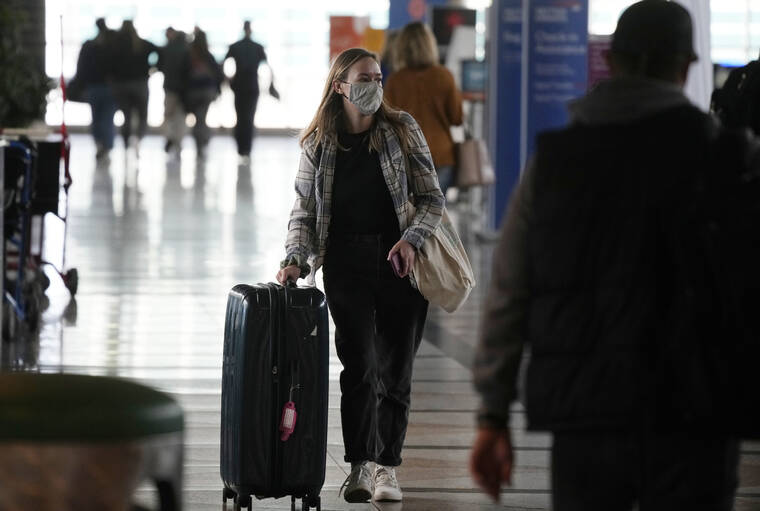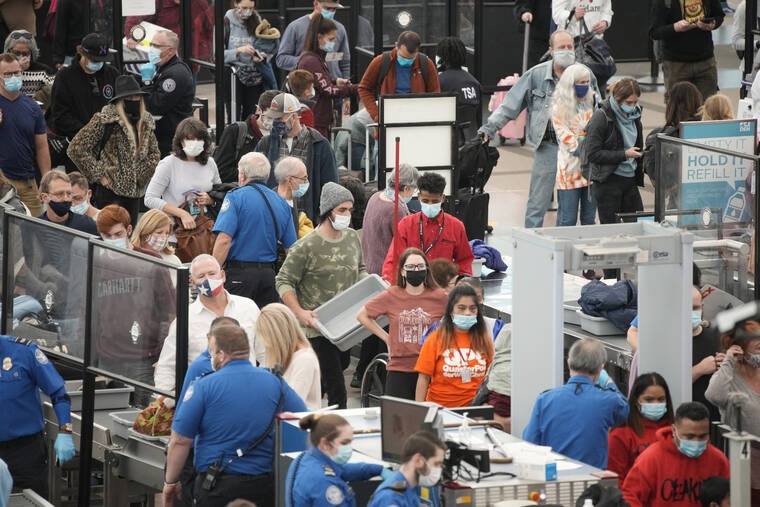DALLAS — Determined to reclaim Thanksgiving traditions that were put on pause last year by the pandemic, millions of Americans will be loading up their cars or piling onto planes to gather again with friends and family.
The number of air travelers this week is expected to approach or even exceed pre-pandemic levels, and auto club AAA predicts that 48.3 million people will travel at least 50 miles from home over the holiday period, an increase of nearly 4 million over last year despite sharply higher gasoline prices.
Many feel emboldened by the fact that nearly 200 million Americans are now fully vaccinated. But it also means brushing aside concerns about a resurgent virus at a time when the U.S. is now averaging nearly 100,000 new infections a day and hospitals in Michigan, Minnesota, Colorado and Arizona are seeing alarming increases in patients.
The seven-day daily average of new reported cases up nearly 30% in the last two weeks through Tuesday, according to figures from Johns Hopkins University. The U.S. Centers for Disease Control and Prevention says unvaccinated people should not travel, although it is unclear whether that recommendation is having any effect.
More than 2.2 million travelers streamed through airport checkpoints last Friday, the busiest day since the pandemic devastated travel early last year. From Friday through Tuesday, the number of people flying in the U.S. was more than double the same days last year and less than 9% lower than the same days in 2019.
At Newark Liberty International Airport in New Jersey, Christian Titus was heading to visit extended family in Canada. Titus says he’s spent much of the pandemic inside but is willing to risk flying on a crowded airplane because he misses being around his family. He got a booster shot to increase his protection.
“My mental health does better by being around my family during these times,” he said. “Yeah, it’s dangerous. But you love these people, so you do what you can to stay safe around them.”
Meka Starling and her husband were excited for many members of their extended family to meet their 2-year-old son, Kaiden, for the first time at a big Thanksgiving gathering in Linden, New Jersey.
“We’ve put pictures on Facebook so a lot of them have seen pictures of him, but to get to actually touch him and talk to him, I’m excited about it,” said Starling, 44, of West Point, Mississippi.
For their part, airlines are hoping to avoid a repeat of the massive flight cancellations — more than 2,300 apiece — that dogged Southwest and American Airlines at different times last month.
The breakdowns started with bad weather in one part of the country and spun out of control. In the past, airlines had enough pilots, flight attendants and other workers to recover from many disruptions within a day or two. They are finding it harder to bounce back now, however, because they are stretched thin after pushing thousands of employees to quit when travel collapsed last year.
American, Southwest, Delta and United have all been hiring lately, which gives the airlines and industry observers hope that flights will stay on track this week.
“The airlines are prepared for the holidays,” said Helane Becker, an airlines analyst for financial-services firm Cowen. “They cut back the number of flights, the industry has enough pilots, they are putting more flight attendants through their (training) academies, and they are paying flight attendants a premium — what I’m going to call hazardous-duty pay — to encourage people not to blow off work.”
The airlines have little margin for error right now. American expected to fill more than 90% of its seats with paying customers on Tuesday. That’s a throwback to holiday travel before the pandemic.
“There is not a lot of room to put people on another flight if something goes wrong,” said Dennis Tajer, a pilot for the airline and a spokesman for the American pilots’ union.
By late afternoon Wednesday on the East Coast, airlines in the U.S. had canceled fewer than 100 flights, an unusually low number, according to FlightAware. The Federal Aviation Administration reported very few airports affected by significant delays.
“The airport was easy. It took us five minutes to get through security,” said Ashley Gregory, who returned home to Dallas with her husband and daughter after a few days in Jacksonville, Florida.
“But our bags are late,” she added, glancing at the empty baggage carousel at Dallas/Fort Worth International Airport.




